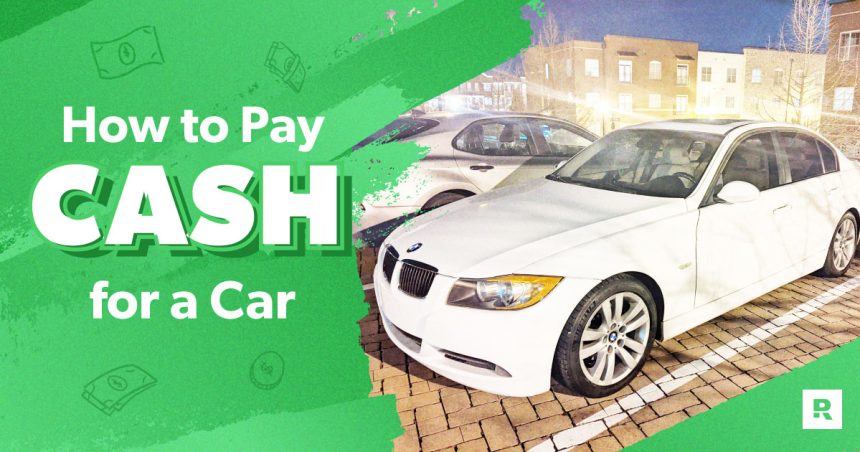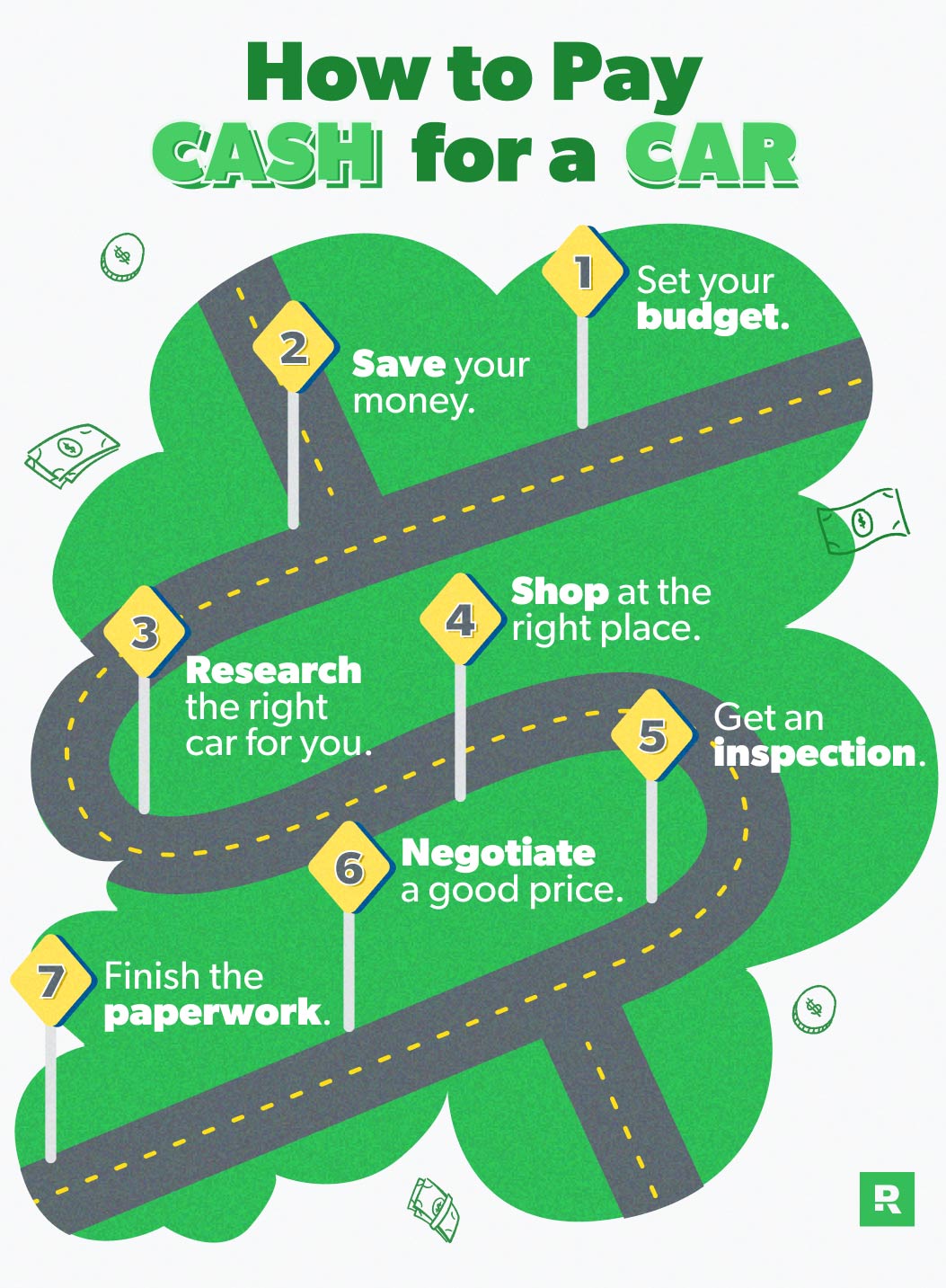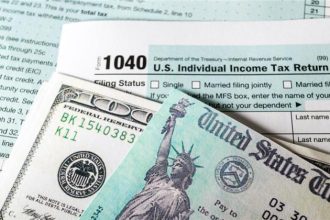So you’re wanting to buy some new wheels. Maybe your check engine light is sending a daily warning or you’ve just been itching to upgrade for a while. You’re thinking about paying cash for the car, but you’re wondering how—or if it’s even possible these days.
Good. News. Yes, it’s totally possible to buy a car without financing—and it’ll save you stacks of cash down the road. Let’s find out how.
How to Pay Cash for a Car
Buying a car can be stressful. Pushy salesmen. Endless options. Upgrade temptations. But listen, if you can keep your head in the game and follow these steps, you’ll end up with a paid-for car—without overpaying.
- Set your budget.
- Save your money.
- Research the right car for you.
- Shop at the right place.
- Get an inspection.
- Negotiate a good price.
- Finish the paperwork.
1. Set your budget.
If you want to pay cash for a car, you need to know how much car you can actually afford! That means making a timeline and deciding that absolutely no one (including yourself) will talk you into something you can’t afford and don’t need.
To get there, ask yourself these questions:
- How much do I already have saved up?
- How long do I have to save money?
Let’s say you need those newer wheels in about six months, already have $3,000 saved, and know you can stash away $500 a month in a sinking fund (which adds up to $3,000 after those six months): Your budget is $6,000 for a car.
Now run your own numbers so you can set your budget—aka decide how much you’re able to pay for your car.
What’s next?
2. Save your money.
Now you get to work. Get in your budget and make the changes you need to save the money you need! That can mean cutting spending, starting a side hustle, saying no to extras . . . and it always means staying disciplined.
If you want to make a game out of saving money, try something like the 100 Envelope Challenge. Get intentional, because saving money is one of the most important steps in paying cash for a car!
3. Research the right car for you.
Start doing research on places like Edmunds, Kelley Blue Book and CARFAX. And keep this in mind—the right car for you is one that:
- is in your budget
- gets you where you’re going
- suits your lifestyle needs and season of life
- is in your budget
Yes, we said that last one twice. Because it really is that important!
But what about new vs. used cars? Here’s our rule of thumb: Unless you’ve got a net worth of at least $1 million, don’t buy a brand-new car. A brand-new car drops about 9% in value the moment you drive off the lot.1 If you got a $50,000 ride, you’d basically be throwing $4,500 out the window on your way home. Gross. Stick to good-quality used cars and let someone else take that hit to their wallet.
There is absolutely nothing wrong with buying a pre-owned car. Don’t let anyone tell you otherwise.
During your research, compare different makes and models, engine sizes and gas mileages. Learn as many facts as you can about the car you want—including prices.
Speaking of which, as you’re looking at prices, you might realize the budget you set doesn’t match the cars you’re seeing. If so, you can do one (or more) of these things:
Any of these options will work. Remember, your main goal is to avoid that car payment and save enough to pay cash for your car.
4. Shop at the right place.
These days, you’ve got a ton of places to buy a used car. To help you get started, we’re highlighting three:
Private Sellers
You can get a great deal when you buy through a private seller. Check out sites like Autotrader, Kelley Blue Book, Craigslist and even Facebook Marketplace if you want to try this method.
Dave’s easiest money-saving tip: See if you’re over paying for car insurance.
Of course private seller purchases comes with some risks. One of the best ways to lower your risk is to take the car to a trusted auto shop and get an inspection—before you buy it. If the seller doesn’t like that, you can always walk away.
Online Car Retailers
Online car retailers are a great option for people who know exactly what they want and don’t like the hassle of searching for the perfect used car. Sites like Carvana and CarMax are great options if you want to be more certain you’re buying quality.
The downside to online car retailers is that there’s not much room for negotiating on price. What you see on the sticker is probably what you get.
Independent Used Car Dealerships
If you choose to buy a car through an independent used car dealership, do your research. Do they have good reviews? Do you know anyone who’s had a successful car-buying experience with them? Ask around your community for recommendations.
When you’re ready to shop, remember to arm yourself with knowledge and have the courage to walk away if a salesman is being too pushy.
5. Get an inspection.
Okay, we already said this under the private sellers section, but let’s be honest: No matter where you decide to shop, you need a car inspection.
Now, a private seller may not be excited to have a stranger drive off in their car before money is exchanged. In that case, you can ask them to take it to your preferred auto shop and have them get a detailed inspection for you.
Also, most online retailers already have pretty strict standards for the cars they sell, and you might not be able to get the car independently inspected before you buy. Research the retailer’s inspection process and ask plenty of questions so you get the full picture of the car’s history.
Just don’t skip checking in on all the car’s possible secrets before you buy.
6. Negotiate a good price.
Now that you’ve found the car (and the inspection checks out), it’s time to make a deal.
You already did your research. You already know your budget—now just don’t budge. Remember, you have the buying power because you’re paying cash for a car, so use these tips for negotiating the best deal on your next car:
- Use your research knowledge. (How does the seller’s price compare with others on the market?)
- Let them know you’ll be paying in cash.
- Don’t budge when they try to upsell you.
- Ask for a deal. (Don’t be afraid to throw out a number.)
- Be quiet. (Less is more.)
- Be prepared to walk away from the deal.
7. Finish the paperwork.
Paperwork is rarely glamorous. But if you skip this step, you won’t actually own the car.
If you purchase at a dealer, all the registration, tags and tax paperwork gets done before you walk out the door with the keys.
But if you’re buying from a private seller, you’ll have to do the work to register the car, pay taxes, and get your own tags. Make sure you check your state’s motor vehicle agency online to figure how and where to do all this!
Pros to Paying Cash for Your Car
If you’re still wondering, even a little, here are a few reasons buying a car with cash is the way to go:
You’ll avoid interest.
If you finance a car, rather than paying for it outright, you’ll end up overpaying. Because . . . interest.
Let’s look at some national averages to see just how much you save when you pay cash for a car:2
|
New Car Financed |
Used Car Financed |
|
|
Average Car Loan |
$40,184 |
$27,167 |
|
Average Interest Rate |
7.03% |
11.35% |
|
Average Loan Term |
About 68 months |
About 68 months |
|
How Much You’d Pay in Interest |
$8,650.06 |
$9,790.52 |
|
Total Cost |
$48,834.06 |
$36,957.52 |
Look at those numbers! The average American would save almost $10,000 in interest if they just paid cash for their car. Yes, please!
You’ll avoid that monthly payment.
These days, the average monthly car payment is $726 for new and $533 for used.3 Yuck.
What else could you do with that money in your monthly budget? Pay off debt. Save for a vacation. Pump up your retirement fund. Get some breathing room to fight inflation. Literally anything besides throwing it out the car window every month as the interest payments pile up. Don’t finance. Keep that money for you.
You won’t end up owing more than your car is worth.
The difference between what your car was worth when you bought it and what you can sell it for now is called depreciation. And like we mentioned before, cars depreciate—or lose value—starting the moment you drive it off the lot. A new car loses 60% of its value in just five years.4 That means if you aren’t careful, you can end up going upside down on your car loan—aka owing more for it than what it’s worth. This never happens when you pay cash.
The car is yours.
Ahh, there’s nothing like driving off in a paid-for car for the first time—especially when your name is on the title. Especially when you worked hard to save up for it.
When you drive off a lot or out of someone’s driveway in a car you just paid for in cash, it just feels different. You’ll never have a car loan hanging over your head. You’ll never have to wonder if your car is worth a lot less than what you owe on it. You’ll never have to worry about what happens if you miss a payment. That’s the peace of mind that comes with buying a car in cash!
Why Car Dealers Don’t Want You to Pay Cash
You’ve probably seen some conflicting advice out there about paying cash for a car. Other sites say it’s best to save your money so you have cash for emergencies. Or they’ll say when you finance your car purchase, you can get a better deal. First off, nope. Secondly, nope.
And here’s the thing: Car dealers want you to get sucked into car payments. Why? They make more money on interest when you finance through them. So get ready for their tricks. They’ll try to convince you a brand-new ride is safer. They’ll say it’s no big deal to ignore your budget for some sweet upgrades. Again, nope and nope.
Yes, honest, helpful car dealers do exist. But most of the time, their only goal is to make the sale—the best sale possible. For them. And that usually includes financing. But car payments are good for their bottom line—not your benefit.
You Can Pay Cash for a Car
You can—and should—pay cash for a car. Yes, it takes hard work, patience and budgeting. But you’ll save (a lot of) money overall and never worry about interest racking up or those monthly car payments. Heck. Yes.
Read the full article here

















